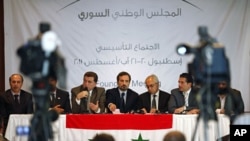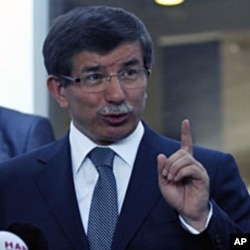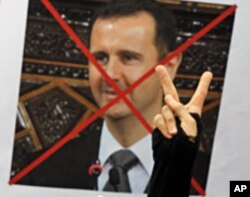Turkey's prime minister and its president have announced they have lost confidence in the Syrian leadership, while the foreign minister warned that Ankara will side with the Syrian protesters against Damascus if forced to choose. The statements are seen as a possible final diplomatic breaking point between the former close allies.
Turkish President Abdullah Gul, in an interview over the weekend, described the government gestures in Syria as too little, too late as the Syrian crackdown against opposition continues. That message was followed up by Prime Minister Recep Tayyip Erdogan in a TV address to the nation Sunday in which he strongly attacked Damascus.
He said a government cannot survive by force or brutality or by shooting and killing unarmed people taking to the streets. He said the only solution is to silence arms immediately and listen to the demands of the people. Mr. Erdogan said the world saw the end of those who did not choose this way in Tunisia and in Egypt, and now observes with sorrow what is being lived in Libya.
Turkish Foreign Minister Ahmet Davutoglu in a TV interview last week said Turkey would always side with the people against the Syrian government, if it came down to a choice. The sustained verbal attack comes weeks after an ultimatum by Mr. Davutoglu calling for an immediate cessation of violence by the Syrian security forces.
Despite the continuation of the crackdown, however, Ankara appeared to have done little, drawing criticism from both the opposition and the media. But a Turkish diplomatic source says diplomacy works to a different calendar than 24-hour journalism, and repercussions are occurring. He said earlier this month, the Turkish foreign minister for the first time met with Syrian opposition leaders.
Diplomatic Columnist Semih Idiz said Ankara may have been "too reluctant to meet with the opposition."
"But there was no reluctance in allowing the opposition to meet in Turkey. So this is the next step. We are now at the stage [where] there is nothing left to be said to Syria. So at this point, given that nothing Turkey has recommended has been followed through by Syria and the violence is continuing," said Idiz. "So under these circumstances, Turkey sees little option but courting the opposition a little."
Syrian opposition leaders had criticized Ankara for failing to reach out to them. But Istanbul has become a regular venue for their meetings.
Last week, some opposition groups announced the formation of a Syrian transitional council, along the lines of what the rebels have done in Libya. International relations expert Soli Ozel says Turkey's ruling AK party with its Islamic roots will find it easy to develop ties with the Syrian opposition.
"Ideologically they have far more sympathy for the [Muslim] brotherhood, which is probably the backbone of the opposition," said Ozel.
But Ankara still resists calls from its Western allies to support Syrian sanctions, claiming it hurts the people more than the government. It also has stopped short of calling for Syrian President Bashar al-Assad to stand down, or to follow the stance of Saudi Arabia and Tunisia in recalling their ambassadors earlier this month.
Political scientist Nuray Mert says even with the hardening of Ankara's stance towards its neighbor, it still has to tread carefully.
"Our relations [are] very complicated in many ways, including the Kurdish dimension. But it's also related [to] the problem concerning Iran. If there is going to be a regime change in Syria, the whole power balance will change," said Mert. "Because if Iran loses Syria, they will lose an important base of power in the Middle East, in the region. So it will be a major defeat for Iran and within this framework if Turkey sides with the dissidents and supports some sort of regime change. Iran will take it directly against itself."
Earlier this month, Mr. Assad reached out to his Kurdish minority, offering them nationality. Observers say with Syrian Kurds making up a large part of the Kurdish rebel group, the PKK, which is fighting the Turkish state, Ankara is increasingly concerned Damascus could be tempted to play the Kurdish card against it, as it did in the 1990s.
Turkey's ruling AK party also has developed unprecedented political and economic ties with Tehran. According to the media, last week, Mr. Erdogan spoke for nearly an hour on the phone in Istanbul with Iranian President Mahmoud Ahmadinejad about Syria. As the violence continues in Syria, observers warn Turkey's regional balancing act can only become more difficult.






